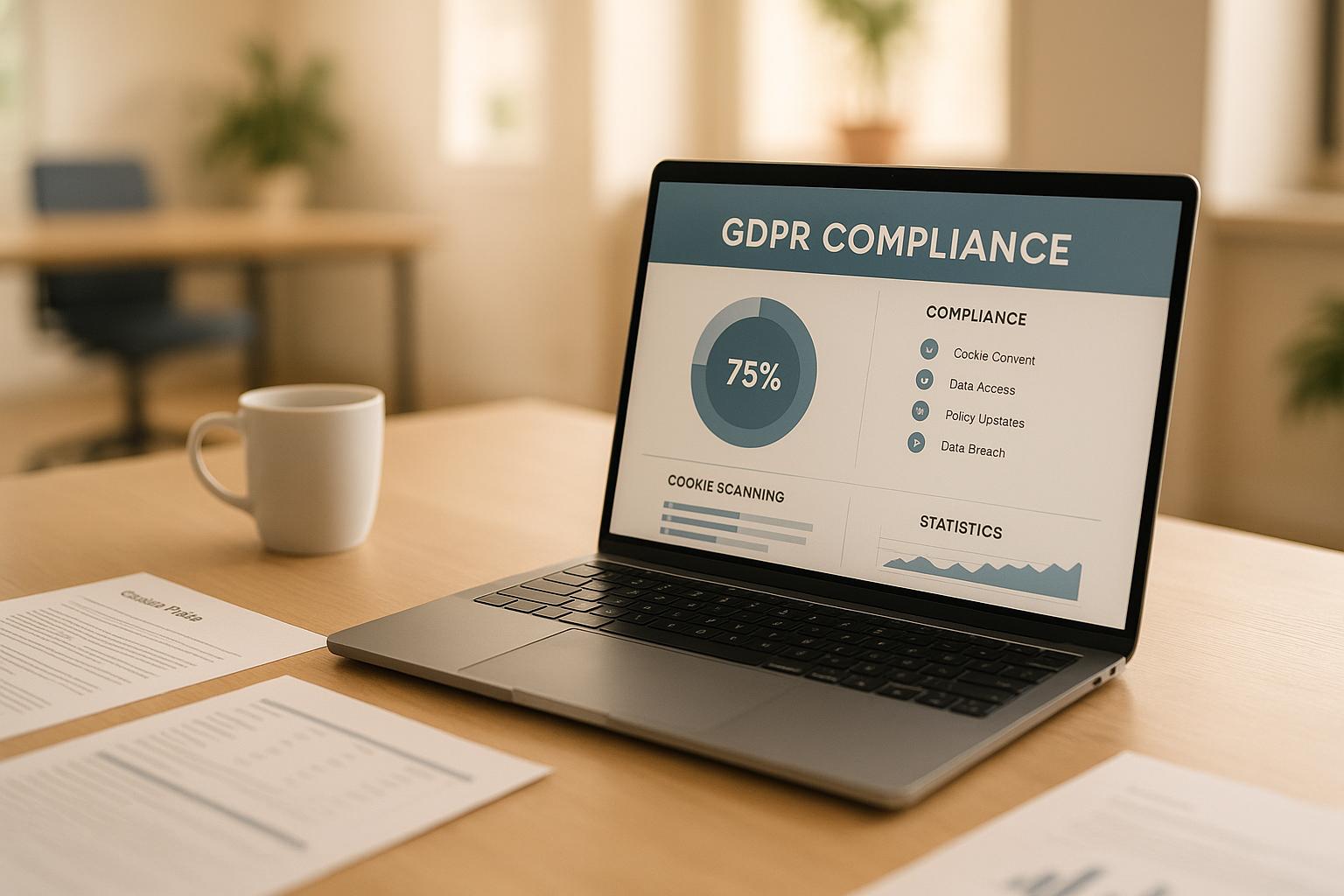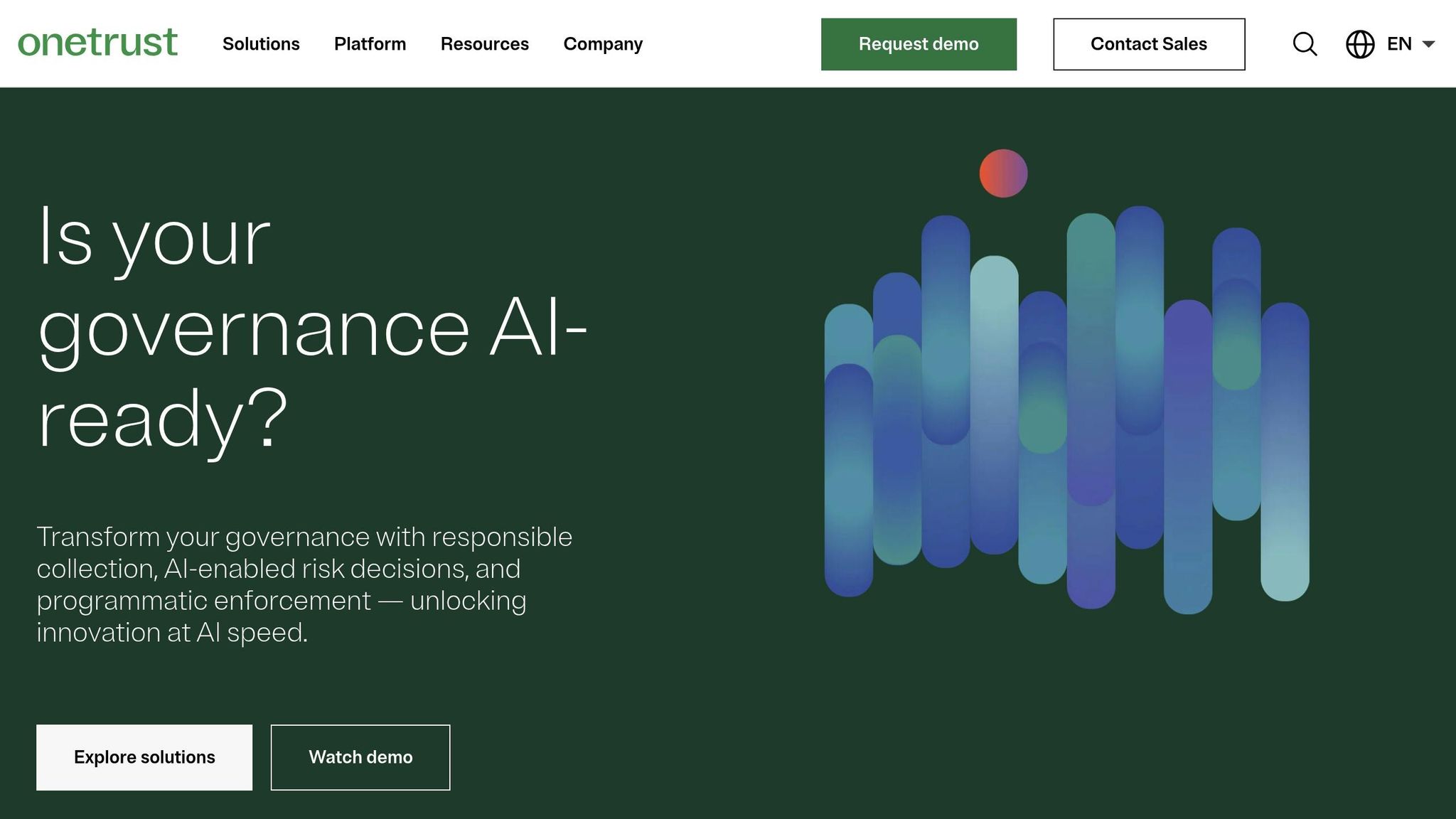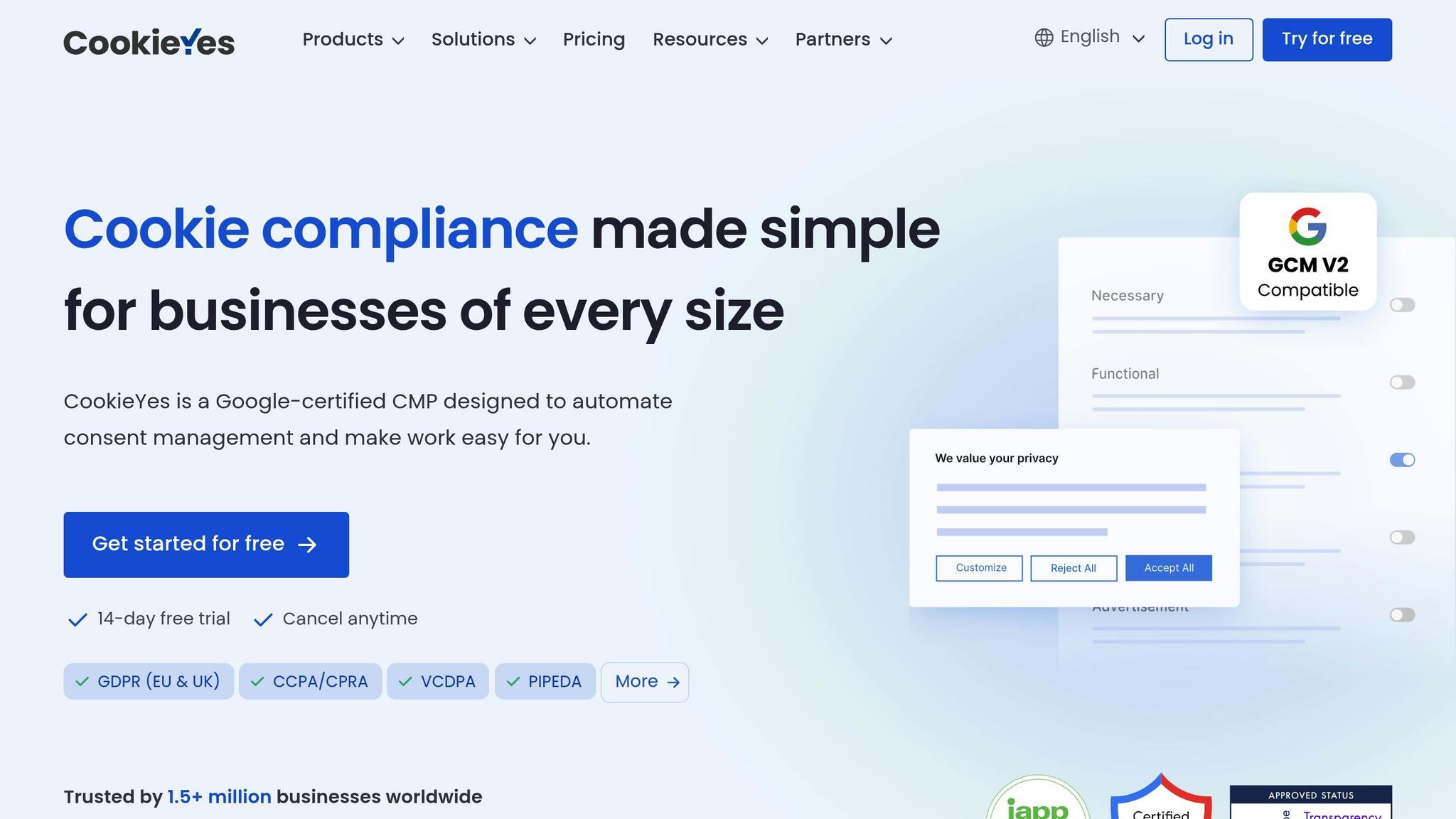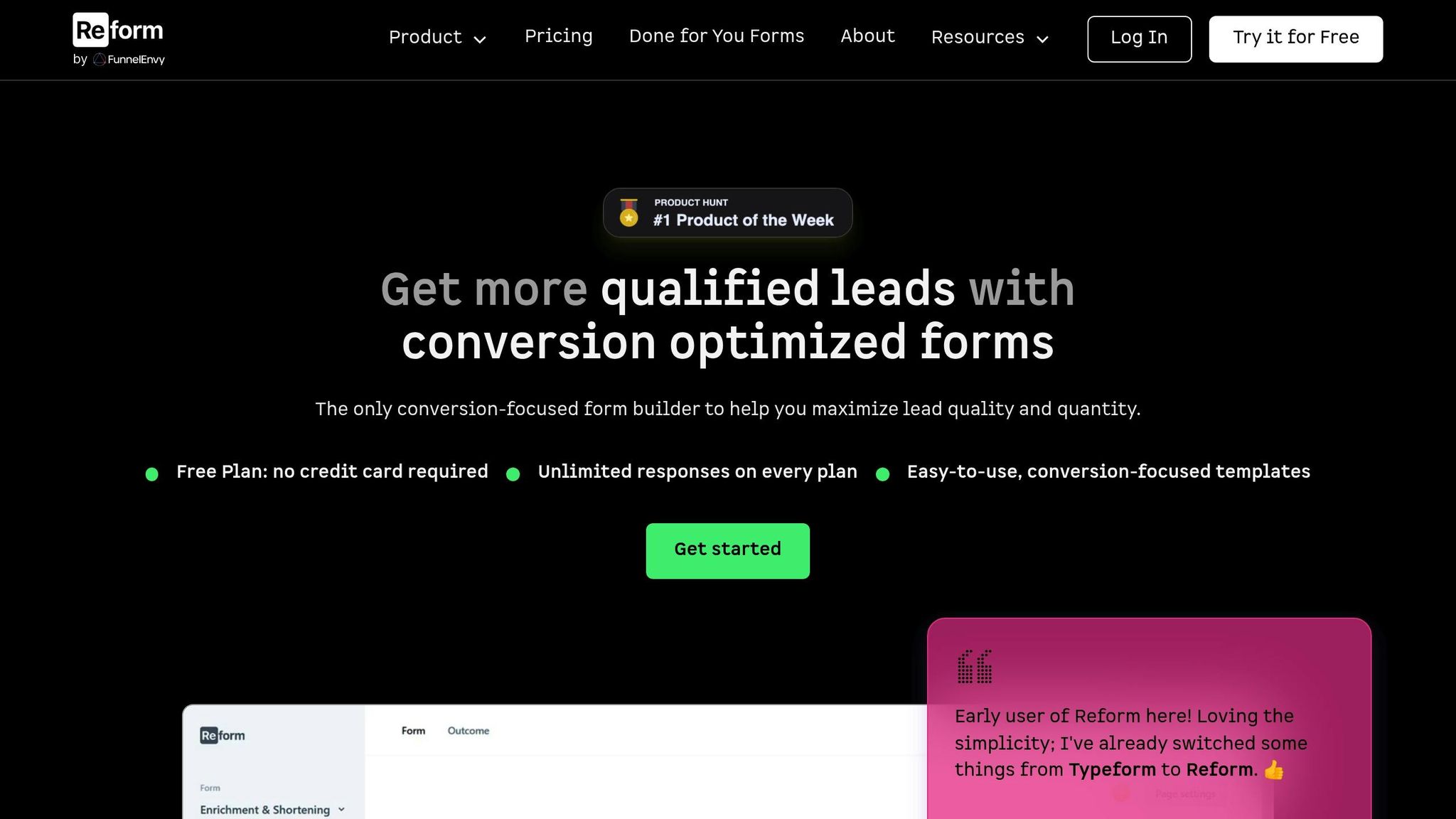GDPR Compliance with Cookie Scanning Tools

GDPR compliance is essential for any website interacting with users in the EU. Websites must obtain explicit consent before collecting personal data through cookies or similar technologies. Automated cookie scanning tools simplify this process by identifying, categorizing, and managing cookies to ensure compliance. Here's what you need to know:
- Why it matters: Non-compliance can lead to fines up to 4% of global revenue or €20 million (about $21.7 million), plus damage to customer trust.
- How tools help: They detect cookies, classify them by type (e.g., necessary, analytics, marketing), and integrate with Consent Management Platforms (CMPs) to block non-essential cookies until users give consent.
- Popular tools: Options like CookieYes, OneTrust, Cookiebot CMP, and CookieScript cater to businesses of all sizes, offering features like automated scanning, multilingual support, and customizable banners.
Quick Tip: Choose a tool based on your business size, traffic, and compliance needs. Smaller businesses may prefer budget-friendly tools like CookieYes, while enterprises might need robust solutions like OneTrust.
Comparison Table
| Tool | Best For | Key Features | Pricing Model |
|---|---|---|---|
| CookieYes | Small to mid-size businesses | No-code setup, policy generators | €9+/month |
| OneTrust | Large enterprises | Advanced compliance features | $50,000+/year |
| Cookiebot CMP | Medium-sized EU businesses | Multilingual, Google integrations | €12+/month |
| CookieScript | Small businesses | Simple setup, flexible integrations | €8+/month |
Bottom Line: Cookie scanning tools not only ensure GDPR compliance but also build user trust and improve lead quality when integrated with privacy-first practices.
What is OneTrust Cookie Consent?

How Cookie Scanning Tools Work
Cookie scanning tools operate behind the scenes to monitor websites, identify tracking technologies, and help ensure GDPR compliance. These tools automatically create detailed inventories of all cookies, tags, trackers, pixels, and beacons on a website - even those hidden behind login screens.
With access to extensive databases of pre-categorized cookies, these tools streamline the categorization process, reducing the workload for compliance teams. For instance, OneTrust maintains a database of over 45 million pre-categorized cookies, providing a solid foundation for automating GDPR compliance.
By automating detection, classification, and consent processes, cookie scanning tools ensure every cookie is identified and categorized correctly before managing user consent.
Cookie Detection and Classification
Through automated crawling, cookie scanning tools uncover all first-party and third-party cookies on a website. These tools mimic user interactions to ensure no cookies go unnoticed. Once identified, cookies are categorized into groups such as necessary, analytics, or marketing.
Consent Logs and Audit Records
CMP Integration
After detecting and classifying cookies, these tools integrate with Consent Management Platforms (CMPs) to enforce compliance. They ensure cookies remain blocked until users provide explicit consent, using various technical methods to achieve this.
- No-code cookie blocking: CMPs automatically block cookies from loading without requiring extra technical setup. They intercept cookie-setting requests and hold them until users give consent.
- Tag Manager integrations: CMPs work with tag management systems to read consent preferences from the data layer. They configure triggers to load third-party scripts only when users have provided the required consent. For example, analytics scripts activate only with approval for analytics cookies, while marketing pixels stay inactive until marketing consent is granted.
- Script re-writing and control: This method involves embedding tracking scripts within consent triggers. These scripts load conditionally, activating only after user consent.
- API integration: Using tools like Google Consent Mode, CMPs communicate user consent preferences to APIs. These APIs then adjust services such as Google Analytics and Google Ads based on the consent status. For instance, aggregated data might be collected for users who have not consented, while full tracking is enabled for those who have.
This layered approach ensures non-essential cookies stay blocked until explicit consent is provided, supporting a privacy-first framework that aligns with GDPR requirements.
Best Cookie Scanning Tools for GDPR
When it comes to GDPR compliance, effective cookie scanning is all about automated detection and categorization. The right tool for your business depends on factors like company size, technical needs, and compliance goals. Whether you’re a small business looking for simplicity or a multinational corporation needing advanced features, there’s a solution to fit your needs. Below are some standout tools that simplify cookie scanning for GDPR compliance.
CookieYes

CookieYes is a great choice for small to mid-size businesses that want an easy, no-code solution. It automatically scans websites to detect cookies and trackers, categorizing them to meet GDPR standards. With customizable cookie banners, you can align the design - like colors, fonts, and messaging - with your brand. A major time-saver is its built-in policy generator, which creates privacy and cookie policies based on the cookies detected, minimizing the need for external legal assistance. Plus, its pageview-based pricing ensures you only pay based on your website traffic, making it a budget-friendly option.
OneTrust
For large enterprises with complex, multinational operations, OneTrust offers a powerful, enterprise-grade solution. Beyond cookie consent, it addresses broader regulatory requirements, making it ideal for organizations with extensive compliance needs. While its comprehensive features are impressive, they come with a steeper learning curve and a higher price tag, best suited for companies with dedicated compliance teams.
Cookiebot CMP by Usercentrics

Cookiebot CMP by Usercentrics provides thorough cookie and consent compliance. It features automated scanning and multilingual support, ensuring that consent banners and cookie policies meet GDPR requirements across various jurisdictions. This makes it particularly appealing for businesses operating in multiple European countries.
CookieScript

CookieScript is designed for growing businesses seeking essential compliance features without unnecessary complexity. It offers customizable banners and flexible integrations, making it easier to adapt to your specific needs while staying compliant.
Here’s a quick comparison of these tools:
| Tool | Best For | Key Strengths | Pricing Model |
|---|---|---|---|
| CookieYes | Small to mid-size businesses | No-code setup, built-in policy generators | Pageview-based |
| OneTrust | Large enterprises | Comprehensive compliance across regulations | Enterprise licensing |
| Cookiebot CMP by Usercentrics | European-focused businesses | Automated scanning, multilingual support | Subscription tiers |
| CookieScript | Growing businesses | Flexible integrations, customizable banners | Tiered pricing |
Each of these tools offers unique features to help businesses of all sizes manage GDPR compliance effectively.
sbb-itb-5f36581
Cookie Scanning Tools and Lead Generation
Cookie scanning tools bring GDPR compliance into the heart of lead generation, allowing businesses to collect valuable prospect data while respecting user privacy and adhering to regulations. The real challenge lies in seamlessly integrating these tools into your lead generation process. When done right, compliance not only protects your business but also helps attract higher-quality leads. This process begins with cookie blocking.
Cookie Blocking Until Consent
One of the standout features of cookie scanning tools is their ability to block non-essential cookies until users give clear consent. When someone visits your site, these tools ensure only essential cookies are loaded immediately. They also keep detailed records of consent, including what types of cookies were approved and how long the consent remains valid.
This system plays a crucial role in lead generation. Many tracking tools and conversion optimizers rely on cookies, and without proper consent management, you could either breach GDPR regulations or lose valuable insights into your prospects' behavior. By managing consent effectively, you strike a balance between compliance and maintaining the integrity of your data collection efforts.
GDPR-Compliant Forms with Reform

Building on the foundation of explicit consent, GDPR-compliant forms add another layer of protection while enhancing your lead generation strategy. Reform integrates seamlessly with cookie scanning tools to create a system that respects privacy without compromising performance. Using features like conditional routing and multi-step forms, Reform ensures that data is only collected with explicit consent, improving both compliance and data quality.
Reform also offers email validation to ensure the accuracy of collected data, while its spam prevention tools minimize reliance on cookies and other tracking mechanisms. Instead of extensive user tracking, Reform focuses on form-level protection, making it easier to maintain lead quality while staying GDPR-compliant. Additionally, its integration capabilities ensure that once users provide consent, their data flows smoothly into your CRM and marketing automation tools.
For businesses using Reform, combining cookie scanning tools with branded, high-performing forms turns compliance into an opportunity. By embedding consent into the form submission process, you can meet regulatory requirements while boosting conversions.
Case Studies: Better Compliance and Lead Quality
Automated cookie scanning tools don't just ensure GDPR compliance - they also enhance user engagement and lead generation. Companies that adopt these tools often notice a temporary dip in tracking data as non-consenting users are filtered out. However, this trade-off typically results in higher-quality leads from users who are actively engaged with the content.
The key takeaway here is that compliance and conversion optimization can go hand in hand. When prospects encounter clear, transparent communication about data usage through well-designed cookie banners, they’re more likely to provide consent and interact with your lead generation forms. This transparency builds trust, encouraging potential customers to share their information willingly.
Cookie Scanning Tool Features and Limits
When selecting a cookie scanning tool to meet GDPR compliance, it's essential to weigh each platform's strengths and limitations. While all major tools bring something valuable to the table, their constraints can influence how well they fit your specific needs. Here's a closer look at the features and drawbacks of some popular options to help you make an informed choice.
CookieYes stands out for its high level of customization and support for over 170 languages, with 40+ auto-translated options. This makes it a solid choice for businesses operating across multiple regions. Its free plan allows up to 5,000 monthly pageviews, making it a good starting point for smaller businesses exploring compliance solutions. However, companies with higher traffic volumes may find themselves quickly needing to upgrade to paid plans, which start at €9 per domain per month.
OneTrust is tailored for enterprise-level compliance, with pricing starting at $50,000+ annually. It’s an excellent option for large organizations managing complex compliance requirements across multiple jurisdictions. Its advanced reporting and audit features are particularly useful for global operations. However, the platform's complexity and steep learning curve can pose challenges for smaller teams without dedicated compliance experts.
Cookiebot CMP by Usercentrics offers automated monthly scanning and a strong focus on GDPR compliance. It integrates seamlessly with Google tools and supports up to 47 languages. As a Google-certified Gold Tier CMP Partner, it brings added credibility. On the downside, lower-tier plans come with limited customization options and reduced scanning frequency, which may not meet the needs of larger or more dynamic websites.
CookieScript is designed with small businesses in mind, offering a quick setup and an intuitive interface. It integrates easily with tools like Google Consent Mode v2 and Google Tag Manager, enabling fast implementation. However, its free version is restrictive, scanning only up to 10 pages per month. To access full GDPR functionality, businesses will need to opt for higher-tier plans, which start at €8 per month.
Cookie Scanning Tool Comparison
Here's a side-by-side comparison of these tools to help you identify the best fit for your needs:
| Feature | CookieYes | OneTrust | Cookiebot CMP | CookieScript |
|---|---|---|---|---|
| Scanning Frequency | Weekly/monthly scheduled | Advanced (unspecified) | Monthly automated | Monthly (basic plan) |
| Free Plan Limits | 5,000 pageviews | Trial only | 50 subpages | 10 pages scanned |
| Starting Price | €9/month per domain | $50,000+ annually | €12/month per domain | €8/month |
| Language Support | 170+ languages | Region-specific options | 47 languages | Multiple languages |
| Google Integration | Gold Partner status | Full support | Google-certified CMP | Gold tier certification |
| Best Suited For | Small to large businesses | Enterprise organizations | Small to medium businesses | Small businesses |
| Customization Level | Extensive options | Region-specific adjustments | Limited on free plan | Website-matching design |
| Technical Expertise | Minimal required | Advanced features need expertise | Basic technical skills | Intuitive interface |
The right tool will depend on your business size, technical resources, and compliance needs. Whether you're a small business just starting out or a large enterprise with complex requirements, choose a platform that not only meets your current needs but can also grow with you as your website and compliance demands evolve.
Key Points and Takeaways
Automated cookie scanning tools play a crucial role in meeting GDPR requirements. They not only help businesses avoid potential penalties but also build trust with users and improve the quality of collected data.
The financial considerations for choosing the right tool depend largely on the size of your business. Smaller businesses often lean toward cost-effective plans, while larger companies may require more expansive solutions with added features and support. It’s worth noting that the cost of implementing a compliant tool is far less than the hefty fines associated with GDPR violations.
From a technical perspective, implementing these tools doesn’t need to be complicated. Most modern cookie scanning tools handle critical tasks like detecting cookies, accurately categorizing them, and managing user consent automatically. Whether you’re looking for an easy-to-use interface or advanced capabilities suited for a dedicated team, there’s a tool to match your needs. Plus, this efficient setup can also enhance your lead generation efforts.
Combining cookie compliance with lead generation workflows creates a win-win situation. It not only draws in users who are genuinely interested in your offerings but also underscores your commitment to privacy, boosting lead quality.
Consistency in scanning is essential for staying compliant and maintaining data accuracy. The frequency and scope of scans are key factors. While basic tools might offer occasional scans, more advanced solutions provide frequent or even real-time monitoring. This ensures that your compliance remains intact, even in rapidly changing digital environments.
For businesses operating on a global scale, language support is another critical factor. Tools with robust multilingual capabilities ensure that compliance messages are clear and localized, helping maintain trust and legal adherence across different markets.
FAQs
How do cookie scanning tools work with Consent Management Platforms (CMPs) to support GDPR compliance?
Cookie scanning tools play a crucial role in working alongside Consent Management Platforms (CMPs). They automatically detect and classify cookies on a website, providing essential data to the CMP for managing user consent effectively.
This collaboration allows CMPs to display clear, legally compliant cookie banners, record user choices, and prevent non-essential cookies from running until consent is granted. On top of that, cookie scanning tools provide real-time updates about the cookies being used. This enables CMPs to adapt cookie behavior instantly based on user preferences, ensuring transparency and compliance with GDPR's strict consent requirements.
What should small businesses and large enterprises consider when selecting a cookie scanning tool?
When choosing a cookie scanning tool, the needs of small businesses and large enterprises differ significantly. For small businesses, priorities should include affordability, simplicity, and features tailored to limited resources. Tools with an easy setup process and essential compliance features are ideal, as they can help meet GDPR requirements without adding unnecessary complexity.
For large enterprises, the focus shifts to tools offering advanced automation, comprehensive reporting, and the ability to scale for complex data environments. These businesses benefit from tools that provide extensive customization and integrate seamlessly with existing systems, ensuring smooth and effective GDPR compliance management.
Regardless of the business size, it’s essential to select a tool that supports GDPR’s detailed consent requirements and offers clear data mapping features. This ensures transparency and helps maintain compliance standards effectively.
How does using a cookie scanning tool enhance website trust and boost lead generation?
Using a cookie scanning tool can significantly improve trust in your website by offering clear and upfront details about how user data is collected and handled. This level of openness aligns with GDPR requirements, reassuring visitors that their privacy is taken seriously. When users feel their data is respected, they’re more likely to interact with your site.
Accurate cookie categorization and consent management also contribute to a smoother, more reliable user experience. This kind of transparency helps build stronger connections with visitors and can increase the chances of conversions, leading to better lead generation. On top of that, automated cookie scanning streamlines compliance processes, minimizing legal risks and freeing up time for businesses to focus on growth.
Related Blog Posts
Get new content delivered straight to your inbox

The Response
Updates on the Reform platform, insights on optimizing conversion rates, and tips to craft forms that convert.
Drive real results with form optimizations
Tested across hundreds of experiments, our strategies deliver a 215% lift in qualified leads for B2B and SaaS companies.


.webp)








